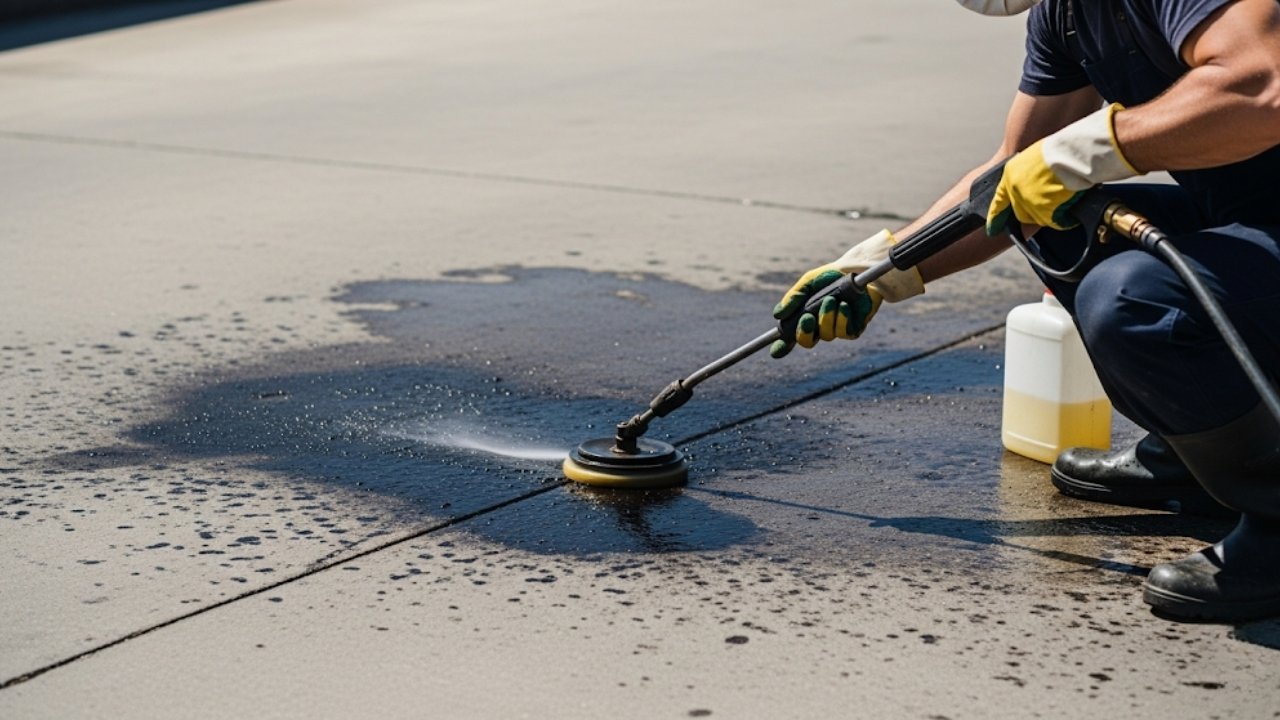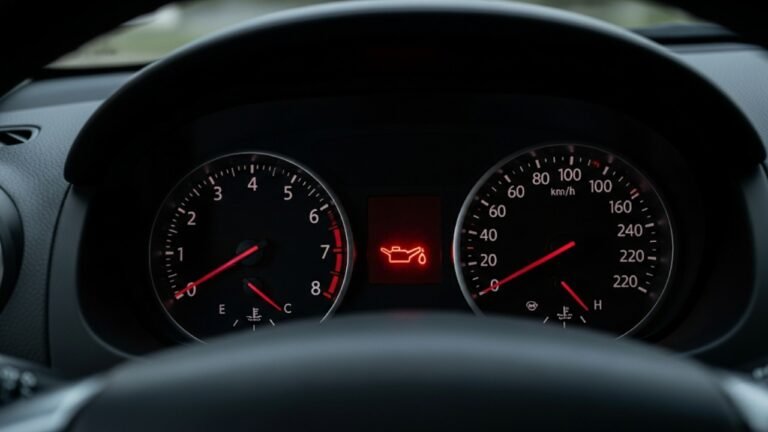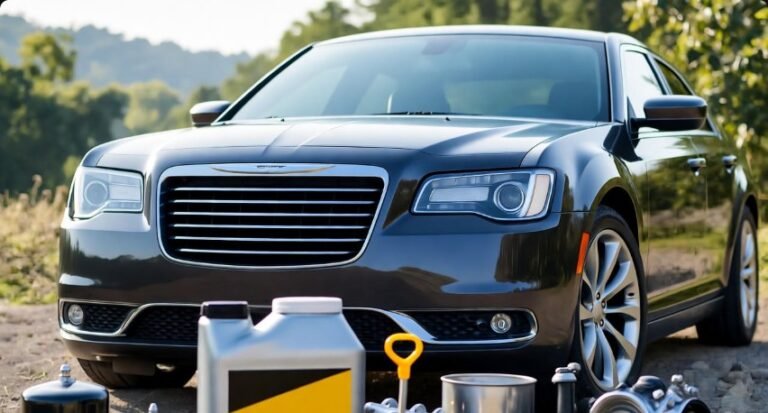Cleaning Car Oil from Concrete: The Ultimate Guide

Have you ever parked your car in the driveway, walked away, and later found a slick, dark patch soaking into the concrete? It’s one of those moments where you feel like your car just betrayed you—dropping oil like it’s marking its territory. Trust me, I’ve been there. That greasy blotch doesn’t just look ugly, it slowly eats into the concrete, becoming harder to remove the longer you wait.
Cleaning car oil from concrete might seem like a chore best left to professionals, but it’s something you can tackle yourself—with the right tools and some smart hacks. This article is your friendly go-to guide, packed with tips, relatable advice, and real-life experience. Whether it’s a fresh spill or an old stain that’s haunted your garage for years, we’ll break down every method that works (and some that don’t).
So, roll up your sleeves, friend. Let’s make that concrete look clean again.
Why Does Car Oil Stick to Concrete So Badly?

The worst part? The longer you wait, the deeper it goes. After a day or two, it’s no longer just a surface stain—it’s embedded in the concrete matrix. That’s why cleaning car oil from concrete isn’t just about wiping it off; it’s about drawing the oil back out.
I learned this the hard way after an oil change gone wrong. One second, I was proud of doing it myself. The next? I had a Rorschach-shaped oil stain right under my engine block. That’s when I went down the rabbit hole of methods, and found out what really works.
Quick Action: What to Do Right After a Spill
Timing is everything. If you catch the spill early, you’re halfway to solving the problem. The sooner you act, the less likely it’ll soak in.
Here’s a quick step-by-step:
-
Blot the oil, don’t rub. Use paper towels or a cloth.
-
Sprinkle baking soda or kitty litter—they’re both excellent absorbents.
-
Let it sit for at least 30 minutes (an hour is better).
-
Sweep it up gently without grinding it into the surface.
Think of it like first aid for your concrete. You’re not fixing the damage yet—you’re stopping it from getting worse.
Top 5 Methods to Clean Car Oil from Concrete
Now let’s talk tactics. There’s no one-size-fits-all solution, but here are the most effective methods I’ve personally tested and researched. Some are cheap and DIY, others are heavy-duty. We’ll start with the basics and move to stronger options.
1. The Baking Soda and Dish Soap Duo
This is the home remedy classic. It’s safe, cheap, and surprisingly effective for fresh stains.
What You Need:
-
Baking soda
-
Dish soap (preferably Dawn)
-
A stiff-bristled brush
-
Warm water
Steps:
-
Sprinkle a generous layer of baking soda over the stain.
-
Pour dish soap on top, just enough to soak the powder.
-
Scrub in circles for 5–10 minutes.
-
Rinse with warm water.
-
Repeat if needed.
This combo works because baking soda lifts grease while the soap breaks down the oil. It won’t always remove old stains completely, but it’s a great place to start.
2. Degreasers: The Heavy Artillery
If dish soap doesn’t cut it, it’s time to bring in a concrete degreaser. These are designed for exactly this problem—cleaning car oil from concrete.
Popular Brands:
-
Oil Eater
-
Zep Concrete Cleaner
-
Simple Green
How to Use:
-
Pour the degreaser directly on the stain.
-
Let it sit for 15–30 minutes.
-
Scrub with a stiff broom or wire brush.
-
Rinse thoroughly with water.
Most degreasers are biodegradable but check the label first. Always wear gloves when using them. I once used Oil Eater on a month-old stain and was shocked at how much it lifted after one go.
3. Poultice Method: Draw the Oil Out
This method is slow but very effective for old or deep stains.
What You Need:
-
A solvent (acetone, lacquer thinner, or commercial oil remover)
-
Absorbent material (cat litter, flour, diatomaceous earth)
-
Plastic wrap
Steps:
-
Mix the absorbent and solvent into a paste.
-
Spread it thick over the stain.
-
Cover with plastic wrap and tape the edges.
-
Leave it for 24 hours.
-
Scrape it off and check the results.
This works like a sponge pulling oil back up. It’s ideal for garage floors where stains are stubborn.
4. Power Washing: Let the Pressure Do the Work
If you have a pressure washer, you already have a powerful cleaning tool. Just be careful with the PSI.
Tips for Best Results:
-
Use a degreaser first to loosen the oil.
-
Let it sit for 15 minutes.
-
Power wash in a sweeping motion.
-
Avoid using more than 3000 PSI to prevent damaging the concrete.
This works best when combined with other methods, especially for cleaning car oil from concrete driveways or garage entrances.
5. Enzyme Cleaners: Nature’s Solution
If you prefer a natural option, enzyme cleaners are worth trying. They contain bacteria that literally “eat” the oil molecules.
Great For:
-
Environmentally-conscious users
-
Outdoor spaces with pets or kids
Brands like ACT Concrete Cleaner and Terminator-HSD are popular choices. These take longer (days or even weeks), but they’re safe and effective for ongoing maintenance.
Let’s Compare: Which Method Works Best?
Here’s a simple comparison table to help you choose the right option:
| Method | Best For | Cost | Time to Clean | Difficulty |
|---|---|---|---|---|
| Baking Soda + Soap | Fresh stains | Low | 30 min–1 hr | Easy |
| Degreaser | Medium to old stains | Medium | 1–2 hrs | Medium |
| Poultice | Deep, stubborn stains | Medium | 24+ hrs | Moderate |
| Pressure Washing | Large surface areas | High | 1–2 hrs | Medium |
| Enzyme Cleaners | Eco-friendly maintenance | Medium | Days to weeks | Easy |
How Long Does It Take to Completely Remove Oil Stains?
This depends on:
-
How old the stain is
-
What kind of oil spilled (motor oil, synthetic, transmission fluid)
-
The temperature and weather conditions
-
Which method you use
For a new stain, you might get full removal in one go. For older ones, it can take a few rounds with different techniques.
I had one stain that took three poultice treatments over a week before it was barely visible—but that felt like a huge win.
How to Prevent Future Oil Stains on Concrete
Prevention is often easier than cure. After going through all the effort of cleaning car oil from concrete, you’ll want to keep that surface spotless for good. Here are a few tricks I’ve used that really work:
1. Use Drip Pans or Mats
You can pick these up at any auto parts store or online. They’re cheap and come in various sizes. Just place one under your engine block, and it’ll catch leaks before they touch the concrete.
2. Seal the Concrete Surface
Concrete sealers are like invisible shields. They don’t stop oil leaks, but they make cleaning up way easier. Oil will stay on the surface instead of soaking in.
3. Maintain Your Car Regularly
Most oil leaks happen because of worn gaskets, loose drain plugs, or damaged oil filters. A good mechanic can spot and fix these early.
4. Park Smart
If you know your car is leaking, don’t keep parking in the same spot. Rotate parking positions to avoid building up stains.
When to Call a Professional Cleaner
Sometimes, no matter what you do, that dark spot just won’t budge. And that’s okay.
Here’s when you might want to call in the pros:
-
You’ve tried multiple methods and still see a stain.
-
The oil has spread over a large area.
-
You’re prepping the house for sale and want it spotless.
-
You don’t have access to pressure washers or industrial cleaners.
Professional cleaners use commercial-grade degreasers, steam equipment, and sometimes even chemical solvents that aren’t available to regular consumers. If you’re short on time or just want guaranteed results, they’re worth it.
I once hired a local cleaning service before hosting an outdoor wedding on my driveway. The difference was night and day. Sometimes, it’s worth the investment.
Bullet-Point Summary: Removing Oil Stains from Concrete
-
Act fast: The sooner you treat the spill, the better the results.
-
Absorb first: Kitty litter and baking soda work wonders on fresh oil.
-
Scrub wisely: Use dish soap, degreasers, or enzyme cleaners.
-
Be patient: Deep stains may take multiple treatments.
-
Prevent stains: Use mats, sealants, and maintain your vehicle.
-
Know your limit: Hire pros if nothing else works.
Common Mistakes to Avoid When Cleaning Car Oil from Concrete
Even with the best intentions, we sometimes make things worse. Here are a few slip-ups I learned the hard way:
-
Using water first: Water spreads the oil deeper. Always blot and absorb before rinsing.
-
Scrubbing with metal brushes too early: They can scratch or damage your concrete if used too aggressively.
-
Skipping the waiting time: Letting cleaners soak in is crucial for lifting oil.
-
Ignoring safety: Some degreasers are strong—use gloves, keep pets away, and ventilate the area.
Real Talk: Is It Ever Truly Gone?
Here’s a truth no one tells you: some stains may never fully disappear. That doesn’t mean you’ve failed. Some oil gets so deep into old, untreated concrete that it leaves behind a faint shadow. But with the right effort, you can reduce it to the point where no one else will notice.
In fact, after a week of trying, I had a faint outline left on my driveway. My neighbor didn’t even see it—until I pointed it out. We’re our own harshest critics, right?
FAQs About Cleaning Car Oil from Concrete
1. Can I use Coke to clean oil stains from concrete?
Yes, Coca-Cola has mild acids that can lift light oil stains. Pour it on, let it sit for an hour, then scrub and rinse. But it’s not effective on older or larger stains.
2. Is pressure washing alone enough to clean car oil from concrete?
Not always. Pressure washing helps, but for best results, combine it with a degreaser. That way, the oil is loosened before blasting it off.
3. How do I clean synthetic oil from concrete?
Use a degreaser or poultice method. Synthetic oil tends to cling tighter than regular oil, so you might need multiple applications.
4. Can oil stains come back after cleaning?
Sometimes, yes. Deep stains may resurface slightly after drying, especially in humid weather. Re-treating the area helps.
5. Will bleach remove oil from concrete?
No, bleach disinfects but doesn’t break down oil. It may lighten the stain but won’t lift it.
6. How do I remove oil stains in cold weather?
Use warm water (not boiling) and increase the soaking time of your cleaning solution. Cold slows down chemical reactions.
7. Can I use vinegar to clean oil off concrete?
Not really. Vinegar is acidic, but not effective against grease. It’s better for hard water stains than oil.
8. What’s the best time of day to clean oil stains?
Late morning or afternoon is ideal when the sun can help warm the concrete and improve absorption and drying.
Personal Reflection: Cleaning as a Labor of Love
You know, we often overlook how much time we spend in our driveways—unloading groceries, fixing bikes, talking with neighbors. It’s part of your home. When it’s clean, it reflects care.
That’s why I now keep a small “oil emergency kit” in my garage—baking soda, gloves, a degreaser bottle, and a stiff brush. It’s my way of being ready, just in case my car decides to leave me another “present.”
Whether you’re cleaning it yourself or calling in the pros, the point isn’t perfection. It’s about maintaining your space with pride and persistence.
Conclusion: Don’t Let Oil Stains Win
Oil stains might seem like permanent scars, but they don’t have to be. With a little knowledge, a few tools, and a good dose of patience, you can reclaim your concrete.
Remember: cleaning car oil from concrete isn’t just about tidying up—it’s about taking ownership of your space. Like tuning your engine or fixing a leaky faucet, it’s a quiet kind of victory.
Now, the next time someone says, “You’ll never get that out,” you can just smile—and show them your clean driveway.






